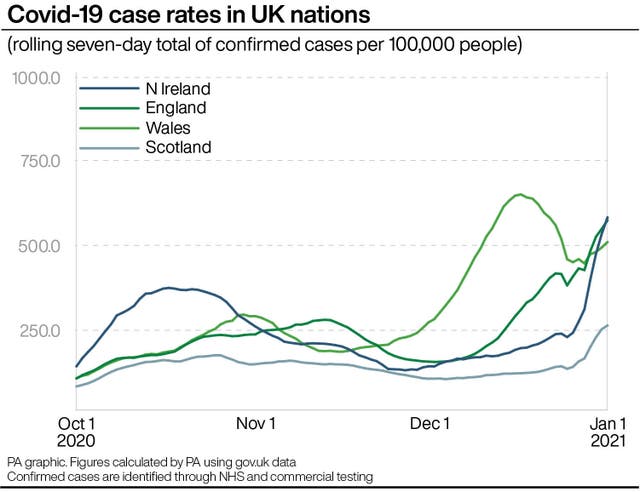Welsh NHS chief warns Covid-19 patient numbers could double from first wave
Almost 2,800 people are in Welsh hospitals with Covid-19-related illness, representing an increase of four per cent in just a week.

The number of coronavirus patients in Welsh hospitals could soon be double that seen during the first wave of the pandemic, the country’s NHS chief executive has warned.
Dr Andrew Goodall said Wales’s health system was under “immense pressure”, with its critical care units operating at 140% of normal capacity and two health boards dedicating almost half their beds to patients with the virus.
Almost 2,800 people are in Welsh hospitals with Covid-19-related illness, representing an increase of four per cent in just a week and the highest number on record following a surge in transmissions over the last fortnight.
On Wednesday, Dr Goodall told the Welsh Government’s press briefing that the sharp rise in cases, blamed on household mixing and a newer more transmissible strain of the virus, meant the NHS “faces a difficult period ahead”.
“If this trend continues, very soon the number of coronavirus-related patients in hospital will be twice the peak we saw during the first wave in April,” he said.
“More than a third of hospital beds are occupied by Covid-related patients. This varies across Wales and is close to 50% in two health boards. This has a significant impact on their ability to deliver local services.”
Dr Goodall said 216 patients were currently occupying critical care beds, 140% of the Welsh NHS’s normal capacity.
And though there was scope to expand capacity further, he warned that doing so would mean other services are further disrupted.
“We are not able to deliver a complete range of NHS services with such high rates of coronavirus in our communities or hospitals,” Dr Goodall said.
“Our priority is to save lives and minimise harm, and to ensure that staff are supported to provide safe care.
“We can only respond to pandemic emergency and urgent care needs by stopping other activities.

“These difficult choices are being made, services and staff are stretched beyond the levels that we would normally see, even at this very challenging time of year.”
He added: “The four chief medical officers have raised real concerns about the risk of the NHS becoming overwhelmed in several areas of the UK.
“The NHS Wales is under immense pressure, but we have made significant changes so people can continue to receive life-saving treatment.
“It’s essential that people get emergency care if they need it and please don’t delay getting help.”
Intensive care consultant Dr Matt Morgan, who works at the University Hospital of Wales, Cardiff, later told BBC Wales he believed January could be the “hardest” month in the history of the NHS.
He said: “I think January will be the hardest month in the pandemic so far. Possibly, the hardest month in the 73 years since Aneurin Bevan started the NHS.
“That’s not just for ICU. It’s important to know about the medical wards, the respiratory wards, the whole hospital system.”
On Wednesday, Public Health Wales said there were a further 2,238 cases of coronavirus, taking the total number of confirmed cases to 161,516.
It also reported another 76 deaths, taking the total in Wales since the start of the pandemic to 3,738.





